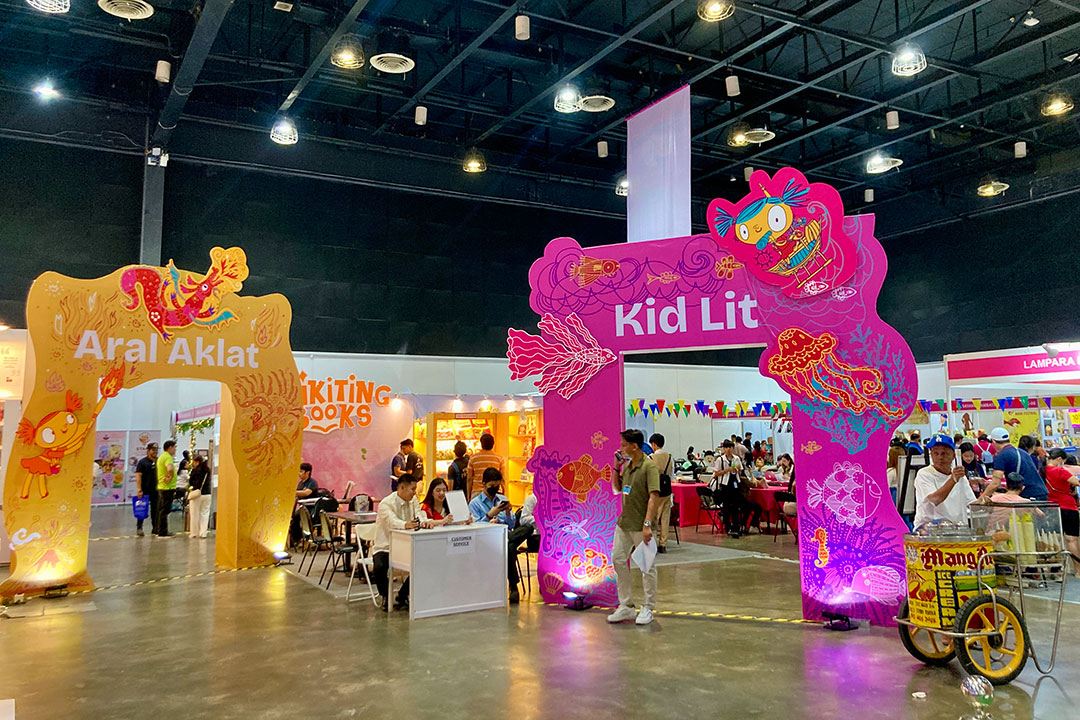A book fair of consequence: Why the Philippine Book Festival matters

By Giselle P. Kasilag
BOOK FAIRS have become a staple in the calendar of most Filipino bookworms over the last 10 years. Two major ones last for a week and attract buyers from all over the country who are hoping to snag the latest bestsellers at a fraction of the cost.
But since its inception last year, the Philippine Book Festival (PBF) is emerging as the most consequential fair to date. The brainchild of the National Book Development Board (NBDB), the PBF brings together the entire spectrum of publishing under one roof for a showcase of Philippine culture driven by the written word.
Not all fairs are equal, and two things distinguish this one from the rest: It is the only national book fair in the country that features only Filipino publishers, authors, and artists; and it has become the preferred marketplace from which the Department of Education sources its Supplementary Learning Resources (SLR) or non-school books. These distinctions are by design. The fair is the book board’s direct response to the challenges that the Philippine publishing and education sectors are experiencing.
“The Philippine Book Festival is shaping up to be the perfect encapsulation of what we and our partners hope to see in the landscape of Philippine publishing — one that champions Philippine authorship and readership, one that asserts that the Philippine author and reader should be at the heart of the celebration, and of a long term campaign to address access and make dedicated readers out of every Filipino,” said NBDB chairman Dante Francis Ang II at the opening ceremony.
“An all-Filipino book fair by Filipinos for Filipinos — the idea shouldn’t be as novel as it sounds. But it is. To my knowledge, before the PBF we have never held a book fair that revolves around the Philippine book, and attempts to shine new light on literature by placing it at the heart of a highly interactive fair complete with performances and a large celebration — something that people wouldn’t normally attribute to books and reading,” he continued.
BRIGHT STARS OF PINOY LIT
Indeed, every square inch of the World Trade Center where the PBF was held was marked with joy, thanks to the beautiful murals by children’s book illustrators Marc Vincent Soriano, Liza Flores, and Beth Parrocha. The space was divided into four realms with archways inspired by the elements to mark the entrances: water for Kid Lit, earth for Komiks, air for Booktopia featuring fiction and non-fiction titles, and fire for Aral Aklat featuring textbooks and educational materials.
Also on display were rare books and facsimiles of important manuscripts including Jose Rizal’s Noli Me Tangere and El Filibusterismo. The festival featured some of the brightest stars of Philippine literature including National Artists Virgilio Almario and Ricky Lee. On stage, the cast of the television series Encantadia including Faith Da Silva, Kelvin Miranda, Angel Guardian, and Bianca Umali held a read-along program. At some point, Ballet Manila performed excerpts of the ballet Tatlong Kuwento Ni Lola Basyang which is based on Anvil Publishing’s series of Christine Bellen-Ang’s retelling of the Severino Reyes’ Lola Basyang stories. And as the Festival came to a close, a cosplay event was held featuring fans portraying beloved characters from Philippine literary pieces.
But the space had an intimacy not common in events of that magnitude. There was Marivi Soliven at the Milflores booth chatting with readers while signing copies of her book, Spooky Mo. Writers Ambeth Ocampo, Butch Dalisay, and Ige Ramos were seen checking out the works of other authors after their respective book signings. Comic book artist Manix Abrera was spied grabbing a quick lunch before heading back to his booth to personally sell his books. Not too far away were his fellow komikeros, Pol Medina, Jr. and Kevin Raymudo of Pugad Baboy and Tarantadong Kalbo fame posing for pictures with fans. The Philippine Book Fair had the ambience of a family reunion rather than a marketplace.
It was the presence of hundreds of public-school principals, teachers, and procurement officers that clearly defined one of the main purposes of the festival. Multiple spaces occupying significant real estate in the venue were devoted to tables and chairs and each one was taken by buyers for the Department of Education (DepEd) who religiously pored over thick catalogues that would inform the purchases that public school students will be reading in the coming school year.
SUPLEMENTAL READING
An important aspect of the PBF and its partnership with the DepEd is the training of book evaluators and procurement officers. This year, over 750 of them from all over the country underwent training that would enable them to scope out books that would best supplement what is being taught in their schools. Thus, the festival ensures that students have access to the best books through purchases from top Filipino publishers who are then able to profit and produce more and better books.
“To redefine a national reading culture while democratizing distribution and responding to issues of access — it’s a tall order for a festival of just four days, held once or twice a year,” Mr. Ang admitted. But he remained hopeful of what this very young festival could accomplish.
“We once again emphasize that we need to continue working against lack of access and against the imbalances in our book import-to-export ratio. If nothing else, I say we have already succeeded, with the PBF being a site for an unprecedented large-scale procurement of books — we now will be able to saturate the market and our schools with relevant, accessible, and affordable Philippine-authored books.”
But lack of access is just one aspect plaguing learning. The other is context. According to DepEd Undersecretary Gina O. Gonong, the urgency to make Philippine-authored books became apparent with the observation that students learn better with materials that reflect their own language and culture. As Senator Loren Legarda said in her welcoming remarks, teaching children to add one batuan plus one batuan instead of oranges or apples simultaneously promotes Philippine culture, and places into the local context academic subjects such as mathematics.
“Beyond the mere scale of this large-scale procurement, this is precisely where the importance of these books lies — it is a step towards raising kids that have a sense of both self and of community,” Ms. Gonong said. “The PBF, then, which serves as the site for this procurement, and as a venue where educators and publishers can have conversations, is extremely valuable to Philippine education. Finally, we are all together in one space, with the singular goal of creating better learning conditions for Filipino students.”



